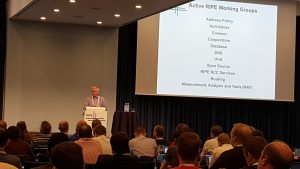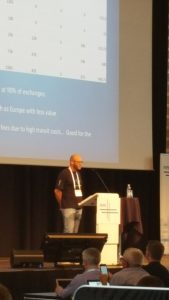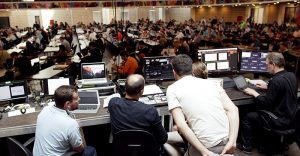Monday, 23 May
Monday was a great start to another record-breaking RIPE Meeting with more than 518 attendees checked in so far. Those that arrived early on Monday participated in parallel tutorials and learned all about RIPE and RIPE NCC in the Newcomers’ Introduction.
RIPE 72 kicked off with the Opening Plenary in a very large(!) and full room with RIPE Chair Hans Petter Holen. He asked for a moment of silence to honour the memory of RIPE Chair Emeritus Rob Blokzijl who passed away late last year. RIPE 72 is the first meeting without him and he is dearly missed.
Hans Petter explained that he’s working on a procedure for an election process for future RIPE Chairs and welcomed input from the RIPE community. Next up was an update from ICANN and a welcome from RIPE 72 host DKNOG. Then it was on to Nordic interconnection and an update on the state of peering in Africa and a lightning talk on an inspiring grassroots RefugeeHotspot project.
The last plenary session of the day featured a look at DNSSEC, a Naughty Port Project and lightning talks on Cryptech, invisibly hijacking, zombies and wild DNS issues. It was a fun session!
After the last plenary session of the day, it was off to the BCOP Task Force and an update on the group’s work.
The day finished with an informal social with the RIPE NCC Executive Board and RIPE 72 Welcome Drinks. See you tomorrow for a full day of Plenary sessions on Day 2 of RIPE 72.
Tuesday, 24 May
Day 2 of RIPE 72 featured a full day of plenary sessions and we had 600 attendees checked in by the end of the day – wow!
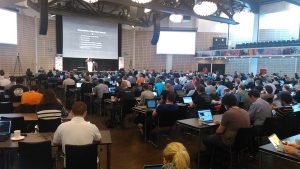
A full house for the morning’s first plenary session
Highlights of the first morning plenary session included:
- CloudFlare’s network automation setup using free open-source tools like Salt and NAPALM and how that lets them control hundreds of points-of-presence in more than 80 locations around the world
- How Google uses massive automation using commodity hardware and software-defined networking
- Why IoT isn’t going to make your company rich and the importance of the Internet community overcoming the hurdles of compatibility, obsolescence and security
After the morning coffee break, the plenary sessions continued.
Highlights included:
- An in-depth look at Comcast’s impressive IPv6 deployment including 90% of their set-top boxes running on native v6!
- Enno Rey discussed poor implementations of IPv6’s Multicast Listener Discovery (MLD) in multiple vendors
- Vaibhav Bajpai compared how top Alexa websites render over IPv4 compared to IPv6 and found that the results were disappointing; many still have errors or missing content with IPv6
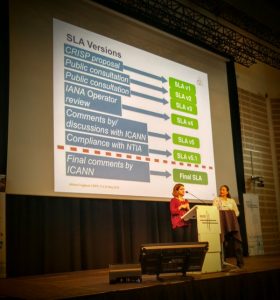
An update from the CRISP team
After lunch, highlights of the afternoon’s first plenary session included:
- An IANA stewardship transition update from the CRISP Team and a thank you for all their hard work
- An entertaining story from Randy Bush on a happy inter-RIR transfer of legacy IPv4 between ARIN and the RIPE NCC
- Showcasing how Russian censorship of webpages affects customers in surrounding countries because of traffic routing and how such impact can be avoided
The last plenary session of the day featured:
- Anna Maria Mandalari on using a crowdsourcing platform to detect filtering of new protocols by middleboxes
- A nice hack from Dave Knight for gathering diagnostic responses from DNS anycast nodes by spoofing a source address
- Statistics and insight on how RIPE Atlas is currently being used
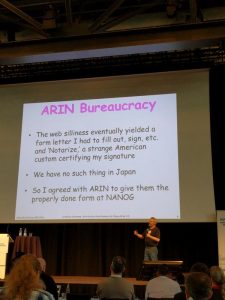
We love Randy’s pink Comic Sans
But wait, there’s more!
The RIPE Academic Cooperation Initiative (RACI) session concluded the meeting day with presentations from RACI attendees on:
- Internet Routing Registries, data governance and security
- Detecting IXPs in trace route paths with tralXroute
- Pondering what would happen if we designed measurements as a first-order service
- The radiography of AS interconnection
…and an Assessing Middlebox Behaviour BoF.
Then everyone hopped into busses and headed to the Tivoli Gardens amusement park for the evening’s social event sponsored by Hilco Streambank.
See you Wednesday for the RIPE Working Group sessions.
Wednesday, 25 May
Day 3 of RIPE 72 kicked off with RIPE Working Group sessions and 627 attendees checked in so far.
The highlights of the first Address Policy Working Group session included:
- Co-Chair Sander Steffann’s term renewed as there were no other candidates standing.
- A discussion on Erik Bais’ “RIPE Resource Transfer Policies” which aimed to combine all of the various transfer-related policy text into one single policy document.
- A discussion on two policy proposals about what to do with the remaining IPv4 pool — each proposal taking opposing approaches, which prompted a lengthy discussion among attendees at the microphones.
In the second Address Policy Working Group session, the highlights included:
- – A presentation on the research into IPv4 transfer market concentration, including noted differences in the transfer data published by the various RIRs.
The Connect Working Group highlights included:
- Interesting presentations by DE-CIX on route servers at IXPs, followed by lively discussion around RPKI invalids and trust anchors.
- Updates from Peering DB 2.0, EURO-IX, and data centre optics trends.
- Lightning talks on the RIPE Atlas Hackathon project about IXPs and the nature of statistics at route servers.
The MAT Working Group highlights included:
- A well-received singing and juggling act by Vesna Manojlovic during her update on RIPE Atlas.
- A question about whether an actual RIPE Atlas Working Group should be formed, which was generally decided was not needed but which led to an interesting discussion about the purpose of the MAT Working Group and RIPE Atlas.
- A presentation by the RIPE Atlas Hackathon winners Shane Kerr and Desiree Miloshevic on their winning project, RIPE Atlas Halo, which allows users to search for information about network outages by date or within a given network (and is available on GitHub).
The IPv6 Working Group’s highlights included:
- Geoff Huston’s talk about large packets in IPv6 and why one should set the “Don’t Fragment bit” to always ON. You can also read this on RIPE Labs.
- John Brzozowski presented a new way for community Wi-Fi and IPv6 by giving a /64 to each device; people thought this was a great idea.
- Jen Linkova presented on how using tricks in the DNS can help validating clients behind NAT64. This created quite some discussion: many people thought this was a bad idea, but it might help to promote IPv6 in the end.
- Enno Rey talked about RFC 7404 and how this can help enterprises to adopt IPv6. In the following discussion, people commented that the proposed solution is not applicable to all network architectures, but might be a good solution for specific cases.
In the RIPE NCC Services Working Group, highlights included:
- A preview of the RIPE NCC Survey 2016 which opens during the Closing Plenary. The survey will be shorter and focused on improvements. Oh, and there are five iPads up for grabs for those that participate in the survey.
- An in-depth look at the RIPE NCC’s outreach efforts, including regional challenges in Europe, Russia and Central Asia and the impact that IoT will have for the RIPE NCC and the RIPE community.
- Alexander Isavnin shared his views on RIPE NCC’s outreach in the Russian and CIS region with criticism that it wasn’t enough. There was a healthy debate with commenters at the microphones that the RIPE NCC has made great efforts to cover that region in particular. Kurtis asked that the conversation be brought to the mailing list because of time constraints.
- An update from RIPE NCC Managing Director Axel Pawlik on RIPE NCC activities.
- A request from IETF management for increased funding from the RIPE community and a plea from Nigel Titley, Chairman of the RIPE NCC Executive Board, for guidance from RIPE NCC members on how the RIPE NCC should proceed here.
- An explanation from Erik Bais on his policy proposal 2016-02 Resource Authentication Key (RAK) Code for Third Party Authentication.
Thursday, 26 May
Day 4 at RIPE 72 featured another full day of RIPE Working Group sessions. We had 655 attendees checked in by the end of the day.
In the Cooperation Working Group:
- RACI attendee Jan Aart Scholte gave a thought-provoking presentation, analysing power relationships in the IANA stewardship transition process, sparking a lengthy discussion
- The working group continued its discussion of co-chair selection, with two candidates speaking to the group and further discussion moving to the mailing list
In the Routing Working Group:
- Rob Evans stepped down as co-chair of the Routing WG and Paolo Moroni was welcomed as a new co-chair
- Stavros Konstantaras disliked the name of his routing information toolset, so he renamed it from ENGRIT to MantaBGP
- The RIPE NCC received positive feedback about their RPKI validator, but there were also calls for more modular code, workshops to help users run this code and to get user input
- Jared Mauch encouraged people to participate in NTT’s effort to create a routing registry that has data verified by humans to improve the data quality of routing information
In the Open Source Working Group:
- A lively discussion took place on the lack of open source testing tools and no free tools for OSPF and IS-IS
- There was positive reception for “Honeypots as a Service” with many offers of cooperation
- And a lot of audience support was shown for Jeff Osborn’s lightning talk proposal on using free open source licenses and building on them to produce software that can be used commercially
Meanwhile, in the Anti-Abuse Working Group:
- A spirited discussion on policy proposal 2016-01 on applying abuse-c to legacy resources took place
- There was a discussion on the need to improve documentation regarding abuse-c
- And a presentation and stimulating discussion took place on the work of law enforcement and how they use the RIPE Database and registry data
There was a jam-packed agenda for the RIPE Database Working Group.
Highlights included:
- Numbered Work Items (NWI) were introduced in the working group in order to create a framework aimed at formalising the process through which problems related to the RIPE DB are defined and solutions are implemented
- The RIPE Chair, Hans Petter Holen, shared discussions that took place at the Public Safety WG (PSWG) in ICANN with regards to the importance
of Registry accuracy
Highlights from the first DNS Working Group session of the day included:
- A presentation highlighting Belgium’s surprising pattern of K-root peering
- A lesson in how to break the Internet with a hundred million dollars
- And preparation for an upcoming KSK rollover
The second DNS Working Group session featured:
- An update on ISC’s alpha testing of BIND 9.11 during RIPE 72
- A presentation on the DNS privacy initiative and a proposal for the RIPE NCC to provide a service in this area if there was community support
- A panel discussion with representatives from DNS operators and DNS hosts on the challenges of introducing new and deprecating old DNS features and DNSSEC algorithms
And, in the IPv6 Working Group:
- There was a look at current IPv6 deployment in various countries in the LACNIC service region, including the fact that a number of mobile operators in the region are not using NAT64 like operators in most other regions
- The challenges of running an IPv6-only network at home were discussed
- A glimpse was given into IPv6 availability in open source code repositories
- And a presentation was given on a project to install an IPv6-only network in the north of Norway and the many problems they faced
And before attendees headed over to the RIPE 72 Dinner, a Moving Screening and Beer BoF took place with a viewing of the documentary “Net
of Rights”.
See you tomorrow for the final day of RIPE 72!
Friday, 27 May
Total number of attendees checked in: 676
The final day of RIPE 72 started slowly but happily after the previous night’s party and entertainment, which was generally agreed to be one of the best in recent memory.
Plenary
The final day of RIPE 72 kicked off with a mixture of the old and new that included the usual NRO reports and an IANA update, along with a special session on bridging the RIPE Community moderated by Jane Coffin of ISOC and including representatives from the MENOG, ENOG and SEE communities. They discussed the unique challenges to each region, operators’ perspectives and the relationship of the different communities with that of RIPE.
Closing Plenary
Geoff Huston gave a self-described “geeky” presentation about the state of IPv4 and IPv6 that included Jackson Pollack-esque visualisations of the IPv4 address space and looked at the effect of NATs on end-to-end connectivity.
Three lightning talks included:
- An introduction of the RIPE Forum, a new, web-based interface for participating on the RIPE Mailing Lists for users who prefer to interact
that way, but which doesn’t change anything for those happy using email clients, which received good feedback from the audience - A presentation by Daniel Karrenberg of the RIPE NCC on using past RIPE Atlas traceroute measurements in new ways, apart from their original intent
- An explanation by Jen Linkova of Google of how using Google Public DNS64 can help with IPv6 deployment
Sjoerd Oostdijck of the RIPE NCC gave the technical report for the meeting, which included an explanation of several technical issues (including the fact that Google thought attendees were still in Romania) but which received positive feedback.
RIPE Chair Hans Petter Holen gave the final presentation and an overview of meeting stats, news and announcements. With a final number of 676
checked-in attendees, RIPE 72 fell two attendees short of being the largest RIPE Meeting to date (after RIPE 69 in London). This included
25% newcomers and attendees from 47 countries.
He reviewed a statement from the BCOP Task Force about IPv4 depletion that received some audience feedback and explained that work has begun
on defining a RIPE Chair replacement procedure.
Working Group Chair Changes:
Thank you to Rob Evans, who stepped down as Routing Working Group Co-Chair and welcome to Paolo Moroni who replaces him.
Programme Committee Changes:
Thank you to outgoing PC members Jan Žorž and Filiz Yilmaz and welcome to incoming members Peter Hessler, Ondřej Surý and Alexander Semenyaka.
There was also a proposal from the PC about appointing a SEE Programme Committee member to the RIPE Programme Committee, which was accepted.
The RIPE NCC Survey 2016 also launched during the closing plenary and will run until 30 June.
Hans Petter closed the meeting by thanking all those involved and inviting everyone to RIPE 73, which takes place in Madrid from 24-28 October 2016.


